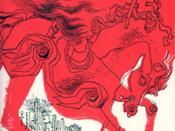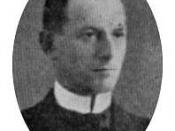In the novel, "The Catcher in the Rye" by J.D. Salinger, the author uses Holden Caulfield's painfulness of growing up to show how he grows into maturity, which is also known as Bildungsroman. Holden Caulfield displays his fear of maturity by often referring to the adult world as what he likes to call "phony". Holden also fantasizes about certain places in which he will never mature to and adult. Ironically speaking, towards the ending of The Catcher in the RyeHolden Caulfield unintentionally matures while he is in the zoo with his beloved sister Phoebe.
Throughout the book Holden often refers to the adult world as what he calls"phony". For example, Holden says, "Like as if Old Ernie was a helluva humble guy, besides being a terrific piano player. It was very phony - I mean him being such a big snob and all." (Pg. 84). Holden refers to old Ernie as phony because of the way old Ernie was acting; as an adult.
Once Holden refers to adult maturity as phony, he is establishing a mental state in which maturity itself fails to exist. For example, if someone is attempting to use counterfeit, or phony money, it is invalid and not accepted in the real world. So by referring to maturity as phony, Holden mentally escapes maturing away from his "innocence".
Holden Caulfield, while having a conversation with his sister Phoebe, mentions an imaginary place in which he is a "Catcher in the Rye". Holden says to his sister, "Anyway, I keep picturing all these little kids playing some game in this big field of rye and all . . . nobody's around - nobody big, except me. And I'm standing on the edge of some crazy cliff . . . I have to catch...


